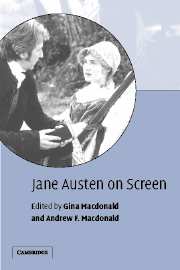Book contents
- Frontmatter
- Contents
- List of illustrations
- List of contributors
- Acknowledgments
- Introduction
- 1 Short “Takes” on Austen: summarizing the controversy between literary purists and film enthusiasts
- 2 Janeite culture: what does the name “Jane Austen” authorize?
- 3 “Such a transformation!”: translation, imitation, and intertextuality in Jane Austen on screen
- 4 Two Mansfield Parks: purist and postmodern
- 5 Sense and Sensibility in a postfeminist world: sisterhood is still powerful
- 6 Regency romance shadowing in the visual motifs of Roger Michell's Persuasion
- 7 Filming romance: Persuasion
- 8 Emma, interrupted: speaking Jane Austen in fiction and film
- 9 Reimagining Jane Austen: the 1940 and 1995 film versions of Pride and Prejudice
- 10 Emma and the art of adaptation
- 11 Clues for the clueless
- Questions for discussion
- Filmography
- Bibliography
- Index
2 - Janeite culture: what does the name “Jane Austen” authorize?
Published online by Cambridge University Press: 05 June 2012
- Frontmatter
- Contents
- List of illustrations
- List of contributors
- Acknowledgments
- Introduction
- 1 Short “Takes” on Austen: summarizing the controversy between literary purists and film enthusiasts
- 2 Janeite culture: what does the name “Jane Austen” authorize?
- 3 “Such a transformation!”: translation, imitation, and intertextuality in Jane Austen on screen
- 4 Two Mansfield Parks: purist and postmodern
- 5 Sense and Sensibility in a postfeminist world: sisterhood is still powerful
- 6 Regency romance shadowing in the visual motifs of Roger Michell's Persuasion
- 7 Filming romance: Persuasion
- 8 Emma, interrupted: speaking Jane Austen in fiction and film
- 9 Reimagining Jane Austen: the 1940 and 1995 film versions of Pride and Prejudice
- 10 Emma and the art of adaptation
- 11 Clues for the clueless
- Questions for discussion
- Filmography
- Bibliography
- Index
Summary
“I can't guarantee that Janeite business, excep' 'e never told a lie since'e was six.'Is sister told me so. What do you think?”
“He isn't likely to have made it up out of his own head,” I replied.
“But people don't get so crazy-fond o' books as all that, do they?'E's made'is sister try to read'em.”
Rudyard Kipling, “The Janeites”Opinions express values, and values may change, but where do we learn them in the first place?
A study of her heroes shows that Jane Austen changed her opinion of gentlemanly deportment, concluding that the active life of service to others should be most valued. From valuing, in principle, the life of leisure because it was necessary to a gentleman's development as a model for lesser citizens, she came to value the active life of industrious service to others. Austen's governing principles of life were generally those espoused and promulgated by the influential conduct books of her youth. Such books, unlike the novels of their time, taught young women how to behave properly as well as told women what society expected of them. From such books Austen learned what her society respected and valued. In contrast, then, as now, many people have expressed concern that young women will be misled by what they read in novels, especially since some novels – romances, for example (then and now) – are unrealistic and may lead to false expectations of what life offers.
- Type
- Chapter
- Information
- Jane Austen on Screen , pp. 22 - 43Publisher: Cambridge University PressPrint publication year: 2003
- 4
- Cited by



